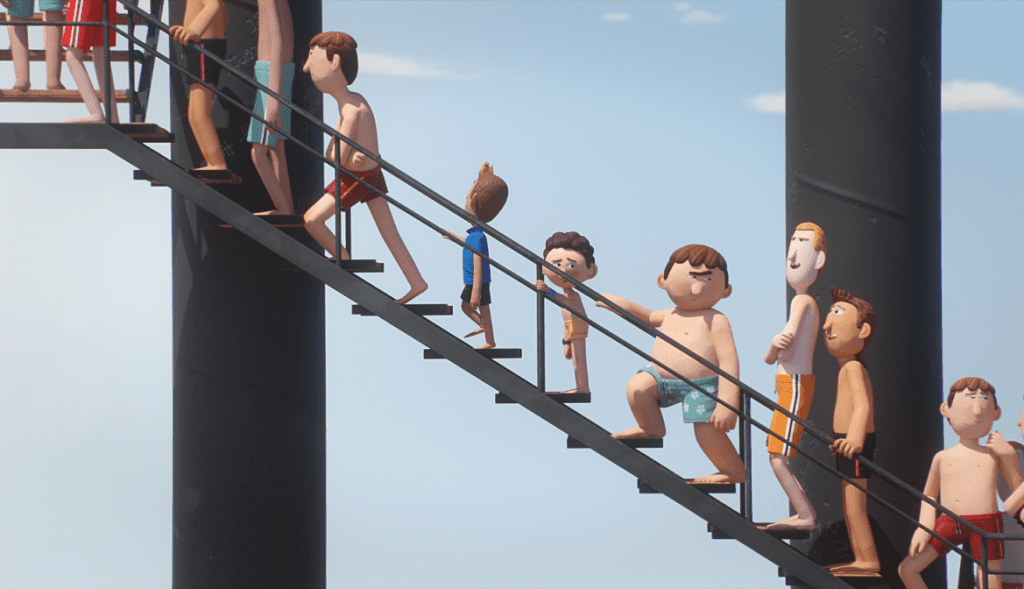Our recent success at the British Animation Awards (BAAs), has brought me to reminisce about the beginnings of this project, and of how we have created an amazing, award winning, animated short film.
I know that we still have a long way to go with our baby, but it was such an honor!
So now as I am flying back home, I must admit that funding a short film is no easy task! But of course, you all know that. Funding ANYTHING these days is close to impossible, but it’s especially relevant with a non-commercial, Indie, Israeli speaking project, whose sole purpose is to share the inner emotions of an, as yet unknown, director.
That being said, I do believe that that is exactly the reason we all came on board this project – because of our belief that this unique story, brought to life by a talented director, has the potential to touch millions.
How did it all start?
When Uri Lotan approached the studio back in 2018, we had already collaborated on a different commercial project. At that time, he was in the midst of a life changing professional dilemma: Take a job NO ONE could possibly refuse, or create his personal short film. He chose the latter and dragged me into it.
Back then it felt as if we were going down an untrodden path – creating a short film which had no specific economic potential (What the heck was I thinking?!).
But now, in retrospect, he made the right decision. I’m still thinking about it.
Funding options in Israel are scarce – there are maximum 3-4 options for funding short films, but they all require building proficient story bibles, attaching well developed visuals, and as much material as possible.
Unfortunately this leads to the never ending “chicken or the egg” conundrum – how can you spend time on development, when you need money to do so, but you can’t get the money without developing your own project?!
Yes, there are some small governmental funds which support development, but these are peanuts compared to the work, and this isn’t worth the wait. (Side note: I, by the way, actually do recommend it when you are still at a very early developmental stage).
But in order to keep the ball rolling, Uri and I started developing with what we had, slowly sketching ideas, diving into the essence of the narrative and spending our valuable spare time in between jobs that we were paid for, to get something down on paper.
We were fortunate that Uri was represented at the time by Hornet.Inc who came up with a wonderful opportunity to privately fund their creators – so we seized the moment and successfully pitched them the idea. Almost immediately they were there by our side, providing us with the necessary ‘air’ to fund designers, concept artists and storyboarders, which pushed us forward.
This also gave me sufficient material to approach the local Israeli funds with a proper proposal. We initially applied to the ‘Pais Film Fund’, which in recent years has been doing incredible work for Indie Israeli projects. Their support is usually quite substantial compared to other Israeli cultural funds, and we were so lucky to check all their boxes and get approved.
We finally got going and even though I didn’t have all the budget in place, we were optimistic and felt that we could really start production, so we took the chance!
We hired our lead designer, Shir Pakman, an amazing Israeli talent, and several other super talents – Charles Larrieu, Lior Lev and Lior Ben Horin and many more! and started working on the Animation test (POC), that would essentially give us the proper understanding of what our film would ultimately look like.
I believe that this was an instrumental moment where we all felt we were doing something phenomenal. The design, the look in the eyes of our hero, the animation pace and style, the textures that blew us away – we knew we were on the right path. It really moved (emotionally but also motionaly!)
BUT (there’s always a but!), this raised another issue, and that was that the production budget we had thought sufficient till the animation test, was not! We realized that we would have to up our financial strategy in order to maintain such high quality animation and style.
Originally, at the outset, we knew, more or less, how much we could potentially raise in Israel and it wasn’t much. Our partners at Hornet were a huge support, but even with them, producing such quality required upping our game and looking for funding in other countries.
It wasn’t an easy task because international funding requires time, and we were on the clock with the Pais Fund. It also takes a while to find the right partners for a project, and then for them to raise their own funds.
But this wasn’t our first project at The Hive Studio that required our co-producing expertise, and so we embarked on our quest for studios to partner with.
At that point of the production Uri had asked the production team to find him a texture artistֿ. We contacted Yuval Turgeman, who had worked with us in the past. He had recently moved to the UK, and had started a full-time job at Flipbook Studio, a 3D animation studio based in Manchester.
When Yuval heard about the project, instead of just dismissing us politely due to his lack of time, he managed to get Jo Wilkinson, the studio producer, and Andrew Lord, the owner, to fall in love with the story as much as he had!
Both Andrew and Jo came onboard immediately, and we quickly signed the studio’s first UK-Israeli co-production.
Flipbook’s belief in the project was as strong as ours, really seeing into the depths of the story, and they became true partners who invested their time and money into this short film, for which we will be eternally grateful.




